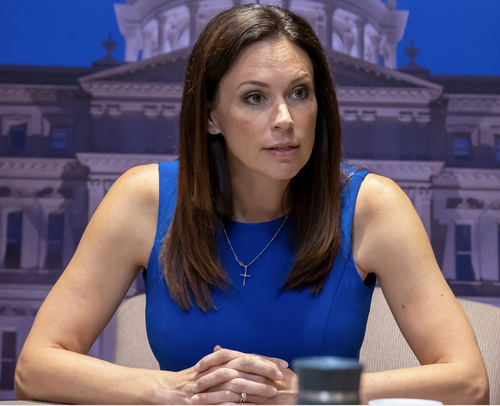
In a decisively lopsided win for pro-abortion activists, Kansas voters on Tuesday rejected a proposed amendment to the state constitution that would have expanded the legislature's power to restrict abortions. With 98% of votes tallied, "no" votes were ahead 59% to 41%.
It was the first major test of voter sentiment on abortion since the June U.S. Supreme Court ruling that overturned Roe v Wade and effectively left it to individual state legislatures to decide which, if any, abortion restrictions are to be allowed.
The referendum may also be an indicator of voter motivation in the upcoming midterms. Turnout soared to a level not seen since the 2008 primary -- with then-Senator Obama on the ballot -- and may set a record when the counting is done. Observers projected a 36% voter turnout, but it may have hit 50%. Historically, about twice as many Republicans have voted in the state's August primaries compared to Democrats.
To take one example that puts the abortion result in context, consider Ellis County. In 2020, Trump won in a resounding 71%-27% landslide. However, on Tuesday, the "yes" vote only prevailed 58% to 42%.
If the result holds a very big deal. Not a huge surprise based on pre-election polls and Kansas is *slightly* less socially conservative than people assume. But still, confirms that the Dobbs decision was deeply unpopular and will motivate the midterm vote. https://t.co/KCMoJ5IbyF
— Nate Silver (@NateSilver538) August 3, 2022
The ballot measure was aimed at negating a 2019 Kansas Supreme Court ruling. In a 6-1 decision, the court found that abortions are protected under the state constitution as an unenumerated "natural right of personal autonomy."
The operative part of Tuesday's ballot proposition, which was a proposed amendment to the state's constitution, stated:
"The constitution of the state of Kansas does not require government funding of abortion and does not create or secure a right to abortion. The people, through their elected state representatives and state senators, may pass laws regarding abortion, including, but not limited to, laws that account for circumstances of pregnancy resulting from rape or incest, or circumstances of necessity to save the life of the mother."
Despite the referendum outcome, abortions will still be subject to some restrictions in Kansas. According to the Center for Reproductive Rights, they're generally prohibited at 22 weeks and post-viability -- a term that describes the ability of a fetus to survive outside a woman's uterus.
Wow. Kansas. Might be time to reshuffle the conventional wisdom deck for the midterms.
— Dan Rather (@DanRather) August 3, 2022
The Kansas outcome will encourage Democrats to make abortion a defining issue in the midterms. Meanwhile, Tuesday's gubernatorial primary result in Michigan set up a stark abortion-stance contrast in November's general election. Tudor Dixon, a Trump-endorsed former steel industry executive and online conservative commentator, will face incumbent governor, lockdown enthusiast and near-FBI-kidnap-victim Gretchen Whitmer.
As Reuters explains:
Whitmer has made the U.S. Supreme Court's overturning of constitutional protection for abortion a centerpiece in her re-election campaign. Dixon supports a near-total ban on abortion, including for child victims of rape and incest, with the only exception for cases when the life of the mother is at risk.

In a decisively lopsided win for pro-abortion activists, Kansas voters on Tuesday rejected a proposed amendment to the state constitution that would have expanded the legislature’s power to restrict abortions. With 98% of votes tallied, “no” votes were ahead 59% to 41%.
It was the first major test of voter sentiment on abortion since the June U.S. Supreme Court ruling that overturned Roe v Wade and effectively left it to individual state legislatures to decide which, if any, abortion restrictions are to be allowed.
The referendum may also be an indicator of voter motivation in the upcoming midterms. Turnout soared to a level not seen since the 2008 primary — with then-Senator Obama on the ballot — and may set a record when the counting is done. Observers projected a 36% voter turnout, but it may have hit 50%. Historically, about twice as many Republicans have voted in the state’s August primaries compared to Democrats.
To take one example that puts the abortion result in context, consider Ellis County. In 2020, Trump won in a resounding 71%-27% landslide. However, on Tuesday, the “yes” vote only prevailed 58% to 42%.
If the result holds a very big deal. Not a huge surprise based on pre-election polls and Kansas is *slightly* less socially conservative than people assume. But still, confirms that the Dobbs decision was deeply unpopular and will motivate the midterm vote. https://t.co/KCMoJ5IbyF
— Nate Silver (@NateSilver538) August 3, 2022
The ballot measure was aimed at negating a 2019 Kansas Supreme Court ruling. In a 6-1 decision, the court found that abortions are protected under the state constitution as an unenumerated “natural right of personal autonomy.”
The operative part of Tuesday’s ballot proposition, which was a proposed amendment to the state’s constitution, stated:
“The constitution of the state of Kansas does not require government funding of abortion and does not create or secure a right to abortion. The people, through their elected state representatives and state senators, may pass laws regarding abortion, including, but not limited to, laws that account for circumstances of pregnancy resulting from rape or incest, or circumstances of necessity to save the life of the mother.”
Despite the referendum outcome, abortions will still be subject to some restrictions in Kansas. According to the Center for Reproductive Rights, they’re generally prohibited at 22 weeks and post-viability — a term that describes the ability of a fetus to survive outside a woman’s uterus.
Wow. Kansas. Might be time to reshuffle the conventional wisdom deck for the midterms.
— Dan Rather (@DanRather) August 3, 2022
The Kansas outcome will encourage Democrats to make abortion a defining issue in the midterms. Meanwhile, Tuesday’s gubernatorial primary result in Michigan set up a stark abortion-stance contrast in November’s general election. Tudor Dixon, a Trump-endorsed former steel industry executive and online conservative commentator, will face incumbent governor, lockdown enthusiast and near-FBI-kidnap-victim Gretchen Whitmer.
As Reuters explains:
Whitmer has made the U.S. Supreme Court’s overturning of constitutional protection for abortion a centerpiece in her re-election campaign. Dixon supports a near-total ban on abortion, including for child victims of rape and incest, with the only exception for cases when the life of the mother is at risk.








